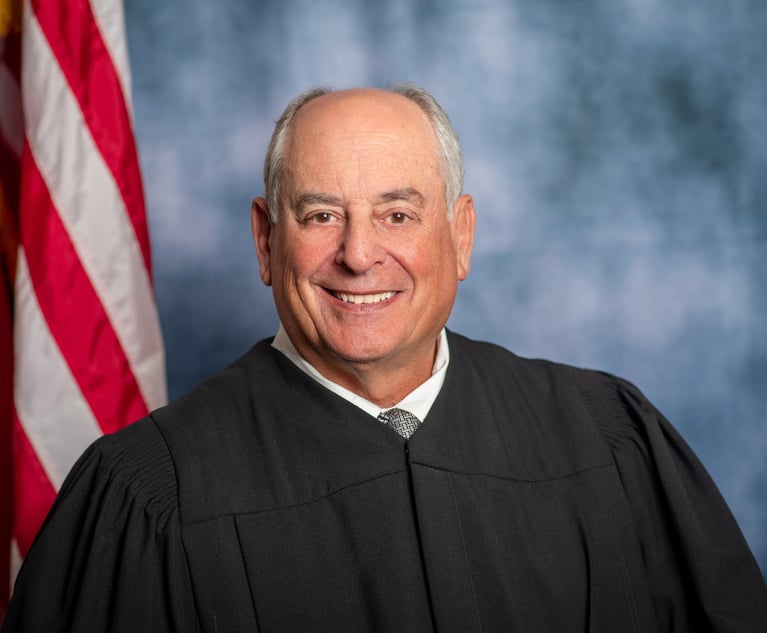 Judge Herbert Phipps, Georgia Court of Appeals. (Photo: John Disney/ALM)
Judge Herbert Phipps, Georgia Court of Appeals. (Photo: John Disney/ALM)Judge Phipps Shares His View From the New Courthouse
"I feel like the man in poem who says, 'Let me live in a house by the side of the road, where the race of men go by,'" Senior Judge Herbert Phipps said.
February 05, 2020 at 02:18 PM
6 minute read
Senior Judge Herbert Phipps says his office in the newly opened Nathan Deal Judicial Center reminds him of the classic humanitarian poem by Sam Walter Foss, "The House by the Side of the Road."
It's just for now. The judge who retired from the Georgia Court of Appeals in 2016 is arguably the state's most experienced temporary employee—filling a vacancy on his old bench.
Phipps marveled at the view from his window during a recent visit to his chambers. He can see Capitol Avenue and the interstate highways that cross the state from east to west (I-20) and north to south (I-85 and I-75 combined in the Downtown Connector).
"I feel like the man in poem who says, 'Let me live in a house by the side of the road, where the race of men go by,'" Phipps said. "I can see where everybody is going."
Phipps wasn't thrilled when he had to retire at the end of November 2016—upon reaching the state-mandated retirement age of 75—after a 45-year career as a civil rights lawyer, a judge for every trial court in his hometown of Albany 200 miles south of Atlanta and 17 years on the Court of Appeals.
His colleagues weren't too happy about it either.
"He is irreplaceable," then-Chief Judge Sara Doyle said at the time. "There isn't going to be somebody who has experienced all that he has."
The great-grandson of a former slave, Phipps fell in love with the law after legendary civil rights lawyer C.B. King came to speak at his school. They became friends. As a teenager, Phipps began going to court to watch King at work. The young Phipps was once hauled off to jail just for "hanging around the courthouse," he said. He was never technically arrested or charged with a crime. But he was held in a cell next to Martin Luther King Jr., who had been arrested during a peaceful civil rights protest. Phipps recalls King passing him dinner through the bars—chicken fried by Albany church women. Phipps followed King to Morehouse College in Atlanta, then followed C.B. King into the practice of civil rights law, working together to desegregate South Georgia schools.
"His life is the American story in one person," then-Judge Nels Peterson said when Phipps retired. Peterson spent his first year on the court serving on a panel with Phipps presiding, placed there by the chief judge to benefit from that experience. Peterson has since moved up to the Georgia Supreme Court.
"Judge Phipps is a once-in-a-generation jurist, and he will leave an indelible mark on our court and the state," said the third member of the panel with Phipps at the time, Judge Stephen Dillard, who succeeded Doyle as chief judge. "He has been (and will continue to be) a champion for civil rights, the rule of law and the common good, and I will miss him more than I can express in words."
At the time of his retirement, Phipps still enjoyed his work and had the energy to keep going, he said at the time. He asked Deal, then governor, for status as a senior judge so he could fill in occasionally.
Since last fall, Phipps has been filling in full-time. He's doing the job left vacant by the death of Judge Steve Goss. Goss was a longtime and beloved trial judge from Albany, a leader in the criminal justice reform movement who led an accountability treatment court and helped start others around the state. Goss joined the appellate court in 2018. But only a year later, Goss was found dead from a gunshot. His death was ruled a suicide.
The heartbroken court asked Phipps to stand in the gap.
It will be up to Gov. Brian Kemp to appoint a permanent successor for Goss. The governor has a short list of nominees for the job on his desk. Judges and lawyers are waiting with anticipation for that decision.
Meanwhile, Phipps is working in the office that would have belonged to Goss—and will later belong to the new judge the governor chooses. As it turned out, Phipps served on the panel that heard the first oral arguments ever for the new building in January: a divorce case that has gone on longer than it took to build the $131 million, six-story judicial center.
The offices were assigned by seniority. The longest-serving judges were given the views that were considered most desirable. Presiding Judge Anne Barnes, the court's dean—having served since 1999, just before Phipps joined—has an office with a straight-on view of the gold dome of the Capitol. Most of the other offices have some version of a gold dome view. But the office where Phipps now works overlooks the other side.
As the court's most-junior member besides the one not yet named, Judge Ken Hodges rates the office next to Phipps. Hodges joined the court in January 2019. He won the job left open when then Judge John Ellington—now Justice Ellington—left to run for the Georgia Supreme Court.
Positioned just a notch more toward the Capitol, Hodges has a view of the highways and the gold dome—and a spot next to his longtime friend and fellow Albany resident.
Hodges said on a recent visit to his chambers that his colleagues are wondering when the governor will fill the opening, but he's in no hurry to lose his neighbor. Said Hodges of Phipps, "I hope he never leaves."
Until further notice, Phipps is working at his desk with the highways in sight and this poetry in mind:
"Let me live in a house by the side of the road, Where the race of men go by—the men who are good and the men who are bad, as good and as bad as I. I would not sit in the scorner's seat, Or hurl the cynic's ban. Let me live in a house by the side of the road And be a friend to man."
This content has been archived. It is available through our partners, LexisNexis® and Bloomberg Law.
To view this content, please continue to their sites.
Not a Lexis Subscriber?
Subscribe Now
Not a Bloomberg Law Subscriber?
Subscribe Now
NOT FOR REPRINT
© 2024 ALM Global, LLC, All Rights Reserved. Request academic re-use from www.copyright.com. All other uses, submit a request to [email protected]. For more information visit Asset & Logo Licensing.
You Might Like
View All
'A 58-Year-Old Engine That Needs an Overhaul': Judge Wants Traffic Law Amended
3 minute read
Fulton Jury Returns Defense Verdict After Pedestrian Killed by MARTA Bus
8 minute read
'The Best Strategy': $795K Resolution Reached in Federal COVID-Accommodation Dispute
8 minute read
Population and Caseload Boom Birth New West Georgia Judicial Circuit
7 minute readTrending Stories
- 1'Largest Retail Data Breach in History'? Hot Topic and Affiliated Brands Sued for Alleged Failure to Prevent Data Breach Linked to Snowflake Software
- 2Former President of New York State Bar, and the New York Bar Foundation, Dies As He Entered 70th Year as Attorney
- 3Legal Advocates in Uproar Upon Release of Footage Showing CO's Beat Black Inmate Before His Death
- 4Longtime Baker & Hostetler Partner, Former White House Counsel David Rivkin Dies at 68
- 5Court System Seeks Public Comment on E-Filing for Annual Report
Who Got The Work
Michael G. Bongiorno, Andrew Scott Dulberg and Elizabeth E. Driscoll from Wilmer Cutler Pickering Hale and Dorr have stepped in to represent Symbotic Inc., an A.I.-enabled technology platform that focuses on increasing supply chain efficiency, and other defendants in a pending shareholder derivative lawsuit. The case, filed Oct. 2 in Massachusetts District Court by the Brown Law Firm on behalf of Stephen Austen, accuses certain officers and directors of misleading investors in regard to Symbotic's potential for margin growth by failing to disclose that the company was not equipped to timely deploy its systems or manage expenses through project delays. The case, assigned to U.S. District Judge Nathaniel M. Gorton, is 1:24-cv-12522, Austen v. Cohen et al.
Who Got The Work
Edmund Polubinski and Marie Killmond of Davis Polk & Wardwell have entered appearances for data platform software development company MongoDB and other defendants in a pending shareholder derivative lawsuit. The action, filed Oct. 7 in New York Southern District Court by the Brown Law Firm, accuses the company's directors and/or officers of falsely expressing confidence in the company’s restructuring of its sales incentive plan and downplaying the severity of decreases in its upfront commitments. The case is 1:24-cv-07594, Roy v. Ittycheria et al.
Who Got The Work
Amy O. Bruchs and Kurt F. Ellison of Michael Best & Friedrich have entered appearances for Epic Systems Corp. in a pending employment discrimination lawsuit. The suit was filed Sept. 7 in Wisconsin Western District Court by Levine Eisberner LLC and Siri & Glimstad on behalf of a project manager who claims that he was wrongfully terminated after applying for a religious exemption to the defendant's COVID-19 vaccine mandate. The case, assigned to U.S. Magistrate Judge Anita Marie Boor, is 3:24-cv-00630, Secker, Nathan v. Epic Systems Corporation.
Who Got The Work
David X. Sullivan, Thomas J. Finn and Gregory A. Hall from McCarter & English have entered appearances for Sunrun Installation Services in a pending civil rights lawsuit. The complaint was filed Sept. 4 in Connecticut District Court by attorney Robert M. Berke on behalf of former employee George Edward Steins, who was arrested and charged with employing an unregistered home improvement salesperson. The complaint alleges that had Sunrun informed the Connecticut Department of Consumer Protection that the plaintiff's employment had ended in 2017 and that he no longer held Sunrun's home improvement contractor license, he would not have been hit with charges, which were dismissed in May 2024. The case, assigned to U.S. District Judge Jeffrey A. Meyer, is 3:24-cv-01423, Steins v. Sunrun, Inc. et al.
Who Got The Work
Greenberg Traurig shareholder Joshua L. Raskin has entered an appearance for boohoo.com UK Ltd. in a pending patent infringement lawsuit. The suit, filed Sept. 3 in Texas Eastern District Court by Rozier Hardt McDonough on behalf of Alto Dynamics, asserts five patents related to an online shopping platform. The case, assigned to U.S. District Judge Rodney Gilstrap, is 2:24-cv-00719, Alto Dynamics, LLC v. boohoo.com UK Limited.
Featured Firms
Law Offices of Gary Martin Hays & Associates, P.C.
(470) 294-1674
Law Offices of Mark E. Salomone
(857) 444-6468
Smith & Hassler
(713) 739-1250






